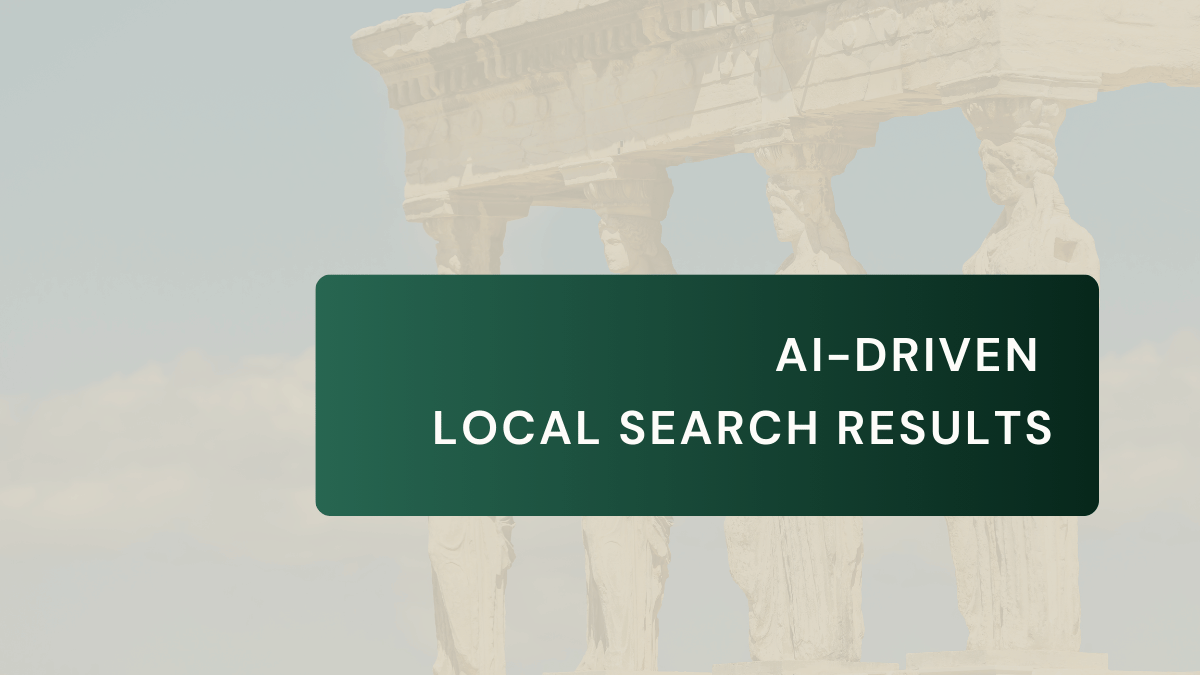AI-Driven Local Search Results
- SEO
- 11 mins
What Attorneys Need to Know
Modern search engines have evolved far beyond simple keyword matching and location tagging. AI-driven local search results use machine learning and natural language processing (NLP) algorithms to deliver highly personalized, contextually relevant results.
AI has fundamentally changed how local search results are generated, prioritized, and displayed. For attorneys and law firms, understanding these changes is crucial for effective and ethical marketing:
1. Understanding User Intent and Context
AI algorithms are designed to go beyond simple keyword matching. They analyze the context, nuances, and intent behind a user's search query. This allows search engines to provide more relevant and personalized results.
When someone searches "personal injury lawyer after car accident," the AI recognizes:
- The legal specialty needed (personal injury)
- The specific case type (car accident)
- The implicit local intent (they need someone nearby)
The AI then generates results tailored to this specific scenario, prioritizing firms with strong signals in these areas rather than simply those who've optimized for basic keywords.
2. Personalized and Contextual Results
AI-driven systems learn from past interactions. They adapt to individual preferences over time, meaning that two users with different search histories might see different local results even for the same query.
Search engines now evaluate:
- The searcher's location (both current and historical)
- Time of day (different results during business hours vs. after-hours)
- Device type (mobile searches often indicate higher immediacy)
- Search history (showing different results for someone who has been researching legal issues vs. a first-time searcher)
3. Integration of Local Business Signals
- Google Business Profile (GBP): Optimizing your GBP is more important than ever. AI systems rely on this profile to extract key data, such as business hours, location, and customer reviews, which directly influence your ranking in local search results. Read more in The Attorney's Guide to Google Business Profile
- Reviews and Engagement: Positive reviews and active engagement (like responses to client feedback) are signals that AI interprets as indicators of trust and reliability, boosting your profile in local packs and map listings. Read more in A Lawyer's Guide to Ethical Client Testimonials
4. Generative AI Search Summaries
AI is being used to generate concise summaries and overviews of local businesses, drawing information from various sources, including Google Business Profiles, reviews, websites, and third-party legal directories.
These summaries may highlight key information about your practice directly in search results.
Users may see comparative information about multiple attorneys presented in easy-to-digest formats.
Let's look at this screenshot. This is a typical result you might see when someone uses an AI-powered search tool, like ChatGPT or similar platforms, asking a question like, 'Who is the best estate planning lawyer in Doylestown, PA?'

Notice a few key things here:
The "Best" Question & The Disclaimer
The user asked for the best. But look closely – the AI often includes a disclaimer, stating that 'selecting the 'best' lawyer depends on individual needs and preferences.' This is crucial. The AI isn't making a subjective judgment call on who is definitively the most skilled lawyer.
How AI Interprets "Best"
Instead of declaring a single winner, the AI interprets 'best' as 'most relevant, reputable, and prominent options' based on the data it can analyze. It's generating a list of highly-ranked local businesses that match the query's specifics – 'estate planning' and 'Doylestown, PA'.
The Ranking Factors (What AI Sees)
How does the AI decide which firms make this list and in what order? It's looking at various digital signals:
- Relevance: It scans websites, Google Business Profiles, and directories to find firms that explicitly list 'estate planning' as a practice area and are located in or verifiably serve 'Doylestown, PA'. The firms listed here clearly fit these criteria based on their online information.
- Prominence/Authority: This relates to how well-known and authoritative the firm appears online. Factors include:
- Completeness of Information: Profiles with hours, full addresses, services listed, and photos (like those shown) often rank better.
- Online Reviews: Google review count and scores heavily influence local prominence. (Though not fully visible here, it's a major factor).
- Website Authority: A well-structured, informative website with relevant content (like mentioning years of experience or certifications, as seen for Maureen Anderson) helps.
- Citations & Mentions: Consistent listings in reputable directories (Avvo, FindLaw, Super Lawyers, etc.) and mentions in local news or legal publications build authority. Some AI tools explicitly reference sources like Best Lawyers or Super Lawyers.
- Distance: Proximity to the location specified in the query (Doylestown) or the searcher's physical location plays a role. The map feature highlights this geographic relevance.
The Output
The interface combines a map view with a ranked list of law firms and attorneys, offering a user-friendly summary to help prospective clients make informed choices.
Key Features Displayed:
- Ranked Listings: The AI ranks law firms and attorneys numerically, with each entry featuring the firm or lawyer’s name, business hours, and a brief description of their specialties and credentials.
- Firm Details: Each listing includes:
- The firm’s or attorney’s name and area of expertise (e.g., elder law, estate planning).
- A summary of services provided, such as asset protection, Medicaid planning, estate administration, and charitable giving.
- Notable credentials, like years of experience or certifications.
- Pricing information: Using dollar signs ($$$ for Eastburn & Gray and Antheil Maslow & MacMinn)
- Actionable Buttons: Users can quickly access directions, the firm’s website, or initiate a call directly from the listing.
- Map Integration: The map visually displays the geographic location of each ranked firm, helping users identify proximity and service area.
- Open Status: Real-time business hours indicate whether the firm is currently open, adding another layer of convenience for users.
Ethical Marketing Implications for Lawyers:
- Visibility is Key: This screenshot demonstrates that your firm's visibility for relevant searches depends on having a robust, accurate, and comprehensive online presence. If your information is incomplete, inconsistent, or inaccurate across platforms, you're less likely to appear in these AI-generated results.
- Accuracy is an Ethical Duty: The Rule 7.1 prohibits false or misleading communications. This extends to the information AI pulls from your website, Google Business Profile, and other directories. Ensure your listed practice areas, experience, location, and hours are accurate and verifiable. Don't stuff keywords or misrepresent your expertise to try and game the system.
- Managing Online Reputation: Online reviews are a significant ranking factor. Ethically encouraging clients to leave honest reviews is part of modern marketing and reputation management. Responding professionally to reviews also signals engagement.
So, while you can't directly control the AI's algorithm, you can ethically manage the input to ensure you are accurately represented and discoverable by potential clients using these tools.
Now let's look at another example. Here, the query is 'licensed family law practice in DC'. What you're seeing is Google's 'AI Overview' – a direct, synthesized answer generated by AI, appearing right at the top of the search results.

Key observations for this type of result:
- Direct Answer, Not Just Links: Unlike traditional search results that primarily show a list of links, the AI Overview attempts to directly answer the user's query. It synthesizes information from multiple web pages it deems relevant and authoritative.
- Query Interpretation: The AI understands the specific intent here: the user needs a family law practice, confirms they are licensed (which it often infers from professional websites and directories), and specifies the location DC.
- How Firms Get Selected and Ranked: Why are these specific firms featured? The AI prioritizes firms based on several factors, pulling data from their websites, Google Business Profiles, legal directories, and other online sources:
- Strong Relevance: These firms likely have website content, profile descriptions, and categories explicitly mentioning "family law," related terms (divorce, custody), and "Washington, D.C." or "DC."
- Authority and Trustworthiness (E-E-A-T): The AI favors sources that demonstrate Expertise, Experience, Authoritativeness, and Trustworthiness. For law firms, this means:
- Clear Practice Area Focus: Dedicated pages or sections on family law.
- Professional Website: Well-structured, informative content.
- Attorney Credentials: Information about attorneys' experience and licensure.
- Online Reputation: Positive reviews and consistent listings inlegal directories (like Avvo, Super Lawyers, FindLaw - AI often scans these).
- Structured Data: Using schema markup (like Attorney or LawFirm schema) on the website helps the AI categorize the information accurately.
- Content Synthesis: Notice the brief descriptions: "provides legal services in family law," "specializes in all areas of family law." The AI generates these summaries by extracting and combining key information from the firms' online presence.
- Format: The AI Overview often presents results in a summarized list or paragraph format, sometimes with images or logos, and includes links for users to click through to the source websites (as indicated by the link icons).
Ethical Marketing Implications for Lawyers:
- Content is Crucial: To appear in these AI Overviews, your online content must clearly and accurately describe your services and location. Use the terms potential clients are searching for. Create high-quality, informative content that answers common questions related to your practice areas (e.g., FAQs about DC family law).
- Accuracy and Rule 7.1: It is important that all information the AI might pull and synthesize about your firm is accurate and not misleading. Ensure your website, directory listings, and profiles correctly reflect your practice areas, attorney credentials, and geographic scope.
- Structured Data (Schema): Implementing schema markup on your website is increasingly important. It provides clear signals to AI about who you are, what you do, and where you practice, increasing the likelihood of being featured accurately.
- Build Online Authority: Focus on ethical strategies to build your online reputation: encourage satisfied clients to leave reviews, maintain consistent NAP (Name, Address, Phone) information across directories, and build a professional online presence.
- Monitor Your Representation: Regularly perform searches like this for your own firm and practice areas to see how AI is presenting you. If inaccuracies appear, you need to identify the source (likely your website or a major directory) and correct it.
In essence, AI Overviews rely heavily on the quality, clarity, accuracy, and authority of your firm's existing online footprint.
How Attorneys Should Respond to AI-Driven Local Search
1. Entity-Based Optimization
AI search engines now view your firm as an "entity" with multiple interconnected attributes:
- Consistency across all digital properties is critical
- Your expertise, authoritativeness, and trustworthiness are evaluated holistically
- Local citations, bar association memberships, court records, and educational credentials all contribute to your entity profile
Action step: Ensure NAP (Name, Address, Phone) consistency across all platforms and actively develop entity associations through legal directories, local organizations, and bar association listings.
2. Semantic Content Development
AI can now understand the substance and depth of your content:
- Create in-depth content that addresses specific legal scenarios relevant to your location
- Use natural language that demonstrates genuine expertise rather than keyword-stuffed content
- Develop location-specific legal resources (e.g., "California Divorce Laws: County-Specific Guidelines")
Action step: Publish content that answers the specific questions your local clients are asking, organized by practice area and jurisdiction.
3. User Experience Signals
AI evaluates how users interact with your online presence:
- Website engagement metrics (time on site, engagement rate, pages per session)
- Google Business Profile interaction rates (clicks to call, clicks for directions)
- Review sentiment and specificity
Action step: Design your website for user experience first, ensuring fast load times, clear navigation, and mobile optimization.
4. Local Knowledge Graph Optimization
Search engines maintain knowledge graphs connecting entities, including:
- Your firm's relationships with local courts, organizations, and events
- Connections to local news mentions and community involvement
- Relationships between attorneys in your firm and their specific credentials
Action step: Build local connections through community involvement, local legal events, and news coverage of your firm's community contributions.
Ethical Considerations in AI-Driven Local Search
As artificial intelligence becomes increasingly integrated into search engines, the ethical responsibilities of lawyers using these technologies grow more complex and important. AI now influences everything from the content users see to the ranking of law firm websites and business profiles in local search results.
While these tools can enhance visibility and improve client acquisition, attorneys must be vigilant to ensure their use aligns with the rules of professional conduct, especially those governing honesty, transparency, and the avoidance of misleading advertising.
Ethical Considerations for Law Firms:
1. Truthfulness in Online Content (Rule 7.1 – Communications About Legal Services):
AI tools favor rich content — but fabricating, overstating, or misleading claims to game AI rankings is a violation of ethical rules.
Tip: Ensure all content, whether AI-assisted or not, is reviewed for accuracy, disclaimers, and compliance with ABA and state bar rules.
2. Manipulation of Reviews and Reputation:
AI can detect patterns of inauthentic behavior, like fake reviews or keyword-stuffed responses.
Google and other platforms may penalize suspicious activity and if discovered, it can damage both your ranking and your reputation.
Ethical red flags include:
- Asking friends or staff to leave fake “client” reviews
- Using AI to generate fabricated testimonials
- Writing review replies that attack or threaten the reviewer
Best practice: Respond to all reviews with professionalism, empathy, and transparency.
3. Transparency About AI Use in Client-Facing Content:
If you’re using AI-generated tools for intake, chatbots, or blog writing, clients have a right to know.
Ethically, you must avoid giving the impression that a bot is a licensed attorney.
Tip: If AI is used in chat or website responses, include disclaimers like:
“This tool is for general informational purposes only and is not a substitute for legal advice. Please contact our office to speak with an attorney.”
4. Bias in AI Search Results:
AI algorithms can unintentionally favor firms with more money, larger review volume, or better technical SEO, even if smaller, highly competent firms offer better service.
Lawyers must understand this dynamic and not assume high ranking equals higher competence.
As a practitioner, you should aim to earn visibility ethically through authentic, client-centered digital strategies.
AI can be a powerful tool to help law firms grow but it’s just that: a tool. The ethical responsibility lies with the lawyer. Attorneys must ensure that their use of AI-driven local search strategies is transparent, honest, and in service of the client’s best interest.
If you want more actionable advice, join the Law Firm Growth Marketing Community





